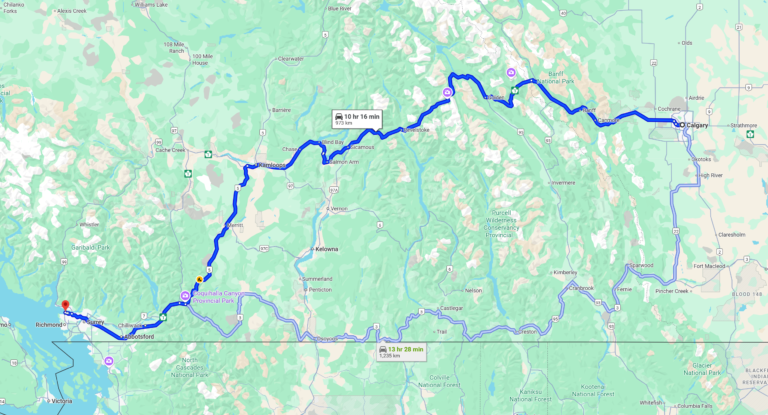Moving costs from Calgary to Vancouver are one of the first things people look into when planning a long-distance relocation. And for good reason—it’s a big move, covering nearly 1,000 kilometers, and it can quickly get expensive if you’re not prepared.
With more Calgarians making the switch to Vancouver’s coastal lifestyle, milder weather, and job opportunities, this route has become increasingly popular.
On average, hiring movers for this long-distance move can cost anywhere from $1,600 to over $9,000, depending on the size of your home, the moving services you choose, and any extras like packing or storage.
In this guide, we’ll walk you through everything you need to know—from what affects your moving costs to tips that can help you stay on budget without sacrificing quality.
Average Cost of Moving from Vancouver to Calgary
Below is a breakdown of typical moving costs based on move size and crew requirements:
| Move Size | Movers + Truck | Estimated Cost (CAD) |
| Studio / 1-Bedroom | 2 movers + 1 truck | $1,950 – $3,100 |
| 2–3 Bedrooms | 3 movers + 1 truck | $3,184 – $6,450 |
| 4+ Bedrooms | 4 movers + 1 truck | $6,700 – $9,100+ |
What’s the Distance Between Vancouver and Calgary?
- Driving Distance: 988 to 1,010 kilometers (about 613 to 628 miles)
- Travel Time by Car: 12 to 14 hours, depending on traffic, road conditions, and route taken (via Trans-Canada Highway/BC-1 E)
If you’re flying, the air distance (straight-line) is around 675 kilometers (about 419 miles), with flight times averaging 1.5 hours.
Factors That Impact the Cost of Moving from Calgary to Vancouver
If you’re planning a move from Calgary to Vancouver, the total cost isn’t just about distance—it depends on several factors, and knowing them upfront can help you avoid surprises.
1. Moving Distance and Route Conditions
Sure, distance plays a big role—Calgary to Vancouver is nearly 970 km. But it’s not just about kilometers. The route includes mountain passes and weather-sensitive areas, especially during winter.
Those conditions can affect travel time, fuel usage, and even how your items are packed and transported.
2. Moving Season and Demand
Planning to move in summer? So is everyone else. Late May to September is peak season, so prices go up and booking slots fill fast. If you’re flexible, moving in the off-season—like late fall or early spring—could save you money and give you more options.
3. Weight of Your Belongings
The heavier your move, the more it costs—especially for long-distance hauls. Many movers base their pricing on estimated weight. If you’re unsure, ask for a weight-based quote or use an online calculator from a moving company to get a ballpark figure.
4. Level of Service Needed
Are you looking for full-service moving (packing, loading, driving, unpacking) or just someone to handle transport? Optional services like disassembling furniture, packing fragile items, or multi-location pickups will increase your total.
5. Cost of Moving Supplies
Boxes, bubble wrap, packing paper, and tape add up fast. If you’re packing yourself, the cost of supplies depends on how much you’re bringing and how fragile your items are. You can save a bit by sourcing free boxes or using your own containers.
6. Insurance Options
Your basic quote may not cover the full value of your belongings. If you’re transporting expensive items or just want peace of mind, you’ll want to upgrade your insurance coverage. Be cautious about choosing the cheapest option—it might not fully protect your valuables in case of damage or loss.
7. Payment Method Fees
Some moving companies charge an extra fee—usually around 3%—for credit card payments. It’s a small detail, but it can affect your final bill, especially for large moves. Ask about preferred payment methods in advance.
8. Exceptional or Fragile Items
Got a piano, antique furniture, or high-end appliances? These require special handling, equipment, or crating. You’ll need to inform your mover ahead of time so they can prepare accordingly—just know that these services come with added costs.
9. Temporary Storage
If there’s a gap between your move-out and move-in dates—or you just need more space while packing—short-term storage can help. Storage doesn’t always cost a fortune, but it’s something to include in your budget if you think you’ll need it.
10. Taxes and Hidden Fees
Don’t forget the tax. Depending on the province and the services you use, you could be charged anywhere from 5% to 15% in taxes. Some websites don’t list tax-inclusive prices, so always check the final quote before booking.
11. Multi-location Pickups or Deliveries
If you’re picking things up from multiple addresses or dropping them off at more than one location in Vancouver, that adds to the labor and time, meaning higher costs.
12. Type of Moving Service
The kind of moving option you choose drastically changes the cost:
- Full-Service Movers: Handle everything from packing to unpacking—most expensive, but least stressful.
- Truck Rentals: More affordable, but you’ll pay for fuel and need to handle loading/unloading yourself.
- Container Services (like PODS or U-Pack): Flexible middle-ground. You load it, they transport it.
- Freight Movers: A cost-effective option for large, heavy loads without paying for traditional moving labor.
Why People are Moving to Vancouver from Calgary?
You’re not the only one making this move—more people are heading west, and it’s easy to see why.
1. Vancouver Is One of the Most Liveable Cities in the World
Vancouver was recently named North America’s most liveable city in The Economist Intelligence Unit’s 2025 Global Livability Index. Vancouver overtook Calgary this year, earning a global ranking of 10th place with 95.8 points—thanks to its quality healthcare, public services, and overall lifestyle. Calgary, which previously ranked higher, dropped several spots in the same report. So, for some, the move back to Vancouver may be a future consideration.
2. A Much Milder Climate
Calgary winters can feel endless. Snowstorms, freezing winds, and icy roads aren’t for everyone. Vancouver, on the other hand, offers milder, coastal weather. Yes, it rains a lot, but many people prefer that to months of snow and -30°C wind chills.
3. Cultural Diversity and a Welcoming Community
Vancouver is one of the most multicultural cities in Canada. You’ll find neighborhoods influenced by a wide range of cultures, international food scenes, and inclusive communities. It’s a city that embraces immigration, which makes it feel welcoming for newcomers of all backgrounds. While Calgary is growing more diverse, it hasn’t reached Vancouver’s level of cultural integration just yet.
4. Ocean, Mountains, and Outdoor Living All in One
In Vancouver, you really do get the best of both worlds—oceans and mountains. Spend your morning skiing at Grouse Mountain and your afternoon kayaking in English Bay. While Calgary has easy access to the Rockies and Banff, Vancouver’s range of outdoor activities is unmatched, and it’s all within city limits.
5. Thriving Job Opportunities
Vancouver’s job market is booming in industries like tech, film production, construction, and renewable energy. It’s also become a hub for startups and video game developers. Calgary, in contrast, remains largely tied to the oil and gas sector, with modest growth in healthcare and education. If you’re in a forward-facing industry, Vancouver opens more doors.
6. Better International Access
Vancouver is much closer to major U.S. cities like Seattle and Portland, and it offers better international flight options. For those who travel for work or have family abroad, it’s a convenient gateway to the U.S. and Asia.
7. Quality of Life for Families
Vancouver appeals to families looking for clean, green neighborhoods with great schools, plenty of parks, and access to recreational programs. The family-friendly vibe is one of the reasons people are willing to pay more to live there.
8. Calgary’s Growing Pains Are Pushing Some Residents Out
While Calgary is still a great city in many ways, issues like overcrowded schools, increased traffic congestion, isolated suburban developments, and extreme winters have started to wear people down. For some, it’s no longer about staying where it’s affordable—it’s about living where life feels more balanced.
9. Lifestyle and Health-Oriented Culture
Vancouver promotes a health-conscious lifestyle. From yoga studios on every corner to organic markets and biking infrastructure, it supports a more active and wellness-driven way of living. That culture attracts young professionals, remote workers, and retirees alike.
How To Reduce Moving Costs from Calgary to Vancouver
- Declutter Before You Move: Sell, donate, or recycle items you don’t need to reduce the volume and weight.
- Move During Off-Peak Season: Schedule your move between October and April when rates are typically lower.
- Book Early: Lock in lower rates by reserving your move well in advance.
- Use Free or Discounted Packing Supplies: Collect boxes from local stores or community groups instead of buying new ones.
- Disassemble Furniture Yourself: Save on labor by prepping large items ahead of time.
- Use Backhaul Options: Ask movers if they have return trips (backhauls) available at a discounted rate.
- Claim Eligible Moving Expenses: If you’re moving for work or school, check if you can claim costs on your taxes.
- Avoid Last-Minute Changes: Sudden adjustments can lead to additional charges.
Breakdown of Typical Costs
While the average cost gives you a general idea, it helps to understand what you’re actually paying for. From base fees to packing supplies and potential surcharges, every element adds up.
Below is a detailed breakdown of typical costs involved when moving from Calgary to Vancouver:
| Category | Estimated Cost (CAD) | Notes |
| Base Moving Fee | $1,600 – $9,100+ | Varies based on home size and distance (~1,000 km) |
| Hourly Rate (per mover) | $139 – $259/hour | Usually includes truck and fuel; 2–4 movers recommended |
| Fuel Surcharge | $100 – $300 | May be separate or included in quote |
| Basic Insurance | Included or $0 – $100+ | Often limited coverage; check contract details |
| Packing Supplies | $100 – $350+ | Boxes, tape, bubble wrap, specialty materials |
| Stairs or Long Carry Fees | $75 – $150+ | If movers must carry items a long distance or up stairs |
| Travel Time Fee | 1–2 hours of labor rate | Charged for the time it takes to get to/from your location |
FAQs
Are There Any Hidden Costs in a Long-Distance Move?
Yes. Be aware of fuel surcharges, stair fees, long carry charges, storage fees, and insurance costs.
Can I Get a Flat-Rate Price for the Move?
Yes, many long-distance movers offer flat-rate pricing after a detailed inventory assessment. It’s a good way to avoid surprise charges.
What is the cost of living in Calgary vs Vancouver?
Vancouver is generally more expensive than Calgary, especially in housing. Rent, groceries, and daily expenses are higher in Vancouver, while Calgary offers lower housing costs and no provincial sales tax, making it more affordable overall.
Wrapping Up
Planning a move from Calgary to Vancouver is about preparing for a big life change. And one of the biggest parts of that process is understanding the costs involved. With more people choosing Vancouver for its milder climate, lifestyle perks, and job opportunities, this route is getting more common, and having the right moving team can make all the difference.
If you’re looking for a reliable and stress-free move, Asr Moving has you covered. We’ve helped countless Canadians move long distances with care, speed, and fair pricing. Get your personalized quote today at Asr Moving and let us make your move from Calgary to Vancouver as smooth as possible.



